 |
 |
 |
 |
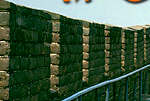 |
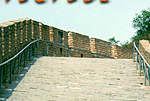 |
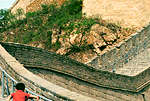 |
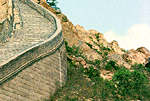 |
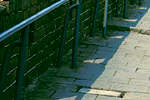 |
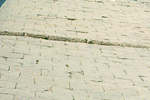 |
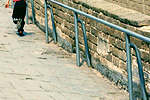 |
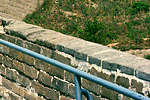 |
 |
 |
 |
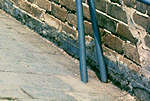 |
|
July 10, 2001 Culture of PollutionNext week the site of the 2008 Olympics will be decided upon. It is very possible that Beijing will be successful in its bid and China will be rewarded with its first Games, unprecedented international spotlight and an influx of foreigners not seen here since the Qing Dynasty. |
|
If successful, it will be largely due to the efforts of virtually every man, woman and child to turn the dusty polluted capital into a whitewashed shiny urban garden. Beijing municipality spent 15 billion yuan since 1997 on the cleanup job with an added 30 billion thrown in by the central government for good measure. The resulting mass mobilization created an environmental consciousness where there was none before. The dust storms and encroaching desert north of the capital as well as the shrinking water supply to Beijing's main reservoirs, Minyun and Guanting, assuredly brought the deteriorating environment to everybody's attention. But it was the big money, the media and advertisement downpour and the exhortation of the Communist party (a fine for spitting for example) that got people to plant trees, dredge the canals and begin throwing garbage into garbage cans instead of onto the street. But not every city in China is blessed with an Olympic bid, tons of cash and the full support of the central government. A foreigner who assumes New Beijing is representative of the New China is seriously mistaken. THE CITYUsing a garbage can is a novel idea for most Chinese outside of the developed cities like Shanghai, Beijing and Hong Kong. Most businesses facing the street deposit waste in a pile near the curb or in a wicker basket at most. Garbage cans are few and far between, and, even when available, are under-used. I've sat in parks and watched people stroll through, unwrap their ice cream or finish smoking their last cigarette and nonchalantly toss the refuse inches from an empty garbage can. The streets of western cities in China look like the aftermath of an outdoor concert. Plastic bags, Styrofoam containers, paper, chopsticks, old shoes, rags of every nature, rinds and bones and everything Sarah Cynthia Sylvia Stout (a character from a Shel Silverstein poem) wouldn't throw out lie strewn haphazardly along the roads, gardens and parks of Chinese cities unfortunate enough to have little foreign presence. The Marriot hotel in downtown Chongqing is the most expensive joint around at 500 yuan ($60) a night. Its air-conditioned lounge with plush leather seats provides a spectacular view of three blocks of refuse, beginning right across the street. It seems the spot was razed in 1998 to provide space for more plush hotels but funds ran out and it soon became the neighborhood dump. Half-demolished buildings and slowly diminishing piles of bricks testify to several weeks worth of demolition, while the beggars' paradise of multicolored, incredibly pungent junk displays the daily destructive might of 4 million Chongqingese. The garbage is sifted by aging men and women with a cart in tow. They pull out what they can use or resell and then mosey on down the road to the next pile of refuse. Every so often, the acrid smell of burning chemicals wafts through my window as I eat my noodles. This is one way people get rid of their garbage. The smell hangs in the air for a day or two, then rains down on the surrounding buildings during the next thunderstorm. The Dazu Buddhist carvings have suffered during the last few decades under the acid rain onslaught. The stone monks' noses melt into their mouths and their appendages have all but disappeared. When the first foreign tourists started arriving five years ago, Chongqing Municipality began realizing the economic benefits of tourism and embarked on a massive restoration effort to bring noses and smiles back to the demons and monks, but one wonders what the situation would be like if there were no tourists. A strong foreign presence can have a dramatic effect on the attitudes of Chinese city dwellers and their environment. Chengdu, the capital of Sichuan, is a relatively clean city: stars are visible and river canals are not choked with garbage. The reasons lie in the wild mountains west of the city and the forests that cover them. China's beauty, so often hidden under dust, grime and concrete, rules calmly and majestically in Western Sichuan. Chengdu is a staging point for camping trips into the mountains, to Tibet, into Yunnan, north to Xinjiang, to the giant Golden Buddha at Leshan and for jaunts up 3079 meter Emeishan, one of China's four Holy Mountains. Consequently, the city is the site of the American Embassy, various Western restaurants, and most conferences concerning the Develop the West campaign. Whitewashed walls bear messages such as, "An environmentally perfect city is a joy to all the people of the world," and, "Keep Chengdu beautiful for the 2000 Develop the West Conference," and so on. Chengdu's environment has improved because of a combination of tourist dollars and the provincial government's desire to accommodate these tourists with the best conditions possible. But cities like Chongqing, Guiyang, Guizhou province, Luizhou, Guangxi province and other poor cities with little foreign investment and few tourist spots do not have the funds or political will to make any significant improvements to the environment. They are still "passing their begging bowl amongst the investors" in search of funds; most of the environmental work is either research or rhetoric. Last year, during a meeting of "foreign experts" and officials of the Chongqing government, the Environmental Minister stood up and delivered a short, vague speech, outlining the government's determination to transform hazy Chongqing into a beautiful green city that will have investors clamoring for space. When pressed for details she said, "We will inform the street side food vendors that the burning of coal is strictly forbidden and that they must now use clean gas." Yeah right. Tell that to Yang Sifu who hauls coal up and down Beibei township's infamous "Backstreet" or Luo Sifu who buys it at roughly 1 yuan a pound for his barbecue stand. There is a Yang Sifu on every backstreet in Sichuan and he's more worried about where the money is than where his garbage ends up. And that's the rub. Nothing short of an Olympic bid, complete with propaganda and massive funds, will change the habits of poor Chinese, the habits of accommodating politicians and, ultimately, the environment of China's tourist-free cities. |
Text-only printable version of this article Sascha Matuszak
is a teacher living and working in China. His articles have appeared
in the South China Morning Post, the Minnesota Daily,
and elsewhere. His exclusive Antiwar.com column appears Tuesdays. Archived columns Sailing
Towards World Significance China's
Youth Revolution |
IF YOU THOUGHT THE CITIES WERE BAD ...Take a drive into the country. At first, the early morning fog and the vast paddies under the shadows of purple mountains make you strain out of your seat and fervently attempt to catch it all and burn it into your consciousness. The lone peasant in blue with his pants rolled up and a pole across his shoulders disappears into the mist at the far end of the field and trees drip crystal dew. But then the weak sun dispels the weaker haze and you are treated once again to the reality of things. Black water struggles its way through feces and garbage into the rice paddies and you remember those three bowls you gobbled with relish last night. Ducks dip their dirty bills into slimy pools and you remember smacking your lips after that last bite. Dust and mud fail to hide the ripped rubber tires and red plastic bags that vie for space in the road with the potholes and mangy mutts. Piles of waste are everywhere, spilling down slopes, lining the roadside, growing within throwing distance of the front door. The village enterprises that blossomed during the 1980s are already churning at high speed by 6:30 am. The backdoors are as black as the peasants shoveling coal in the courtyard, as black as the smog shooting out into the morning air. Peasants toss dumpling wrappers on their way to the fields or the nearest construction site while opening the new pack of smokes. Guess where that plastic wrapper goes. Environmental regulations that have no effect in the cities are completely ignored in the countryside. Urban state-owned enterprises are being revamped and refitted according to European environmental standards, which are more stringent than American standards, but the revamping process has to first succeed in the cities before the countryside can be tackled. A drive through the countryside also reveals denuded hills cultivated all the way to the summit. Wood is in scarce supply in China and trees are routinely poached by peasants who fight their way through guards and rangers. In the winter, nothing will stop a freezing peasant from felling as much wood as he needs. Awareness and education are no match for necessity. TOURIST SITES ARE NOT EXEMPTThe Holy Mountain Emeishan cannot escape the ravages of Chinese tourists with no regard for the environment. Up and down the staircases, even to the frigid top, crested with a yellow, red and orange dragon of a monastery, one finds plastic bottles strewn along the side of the path and empty bags of snacks floating in the Black Dragon River, which crushes boulders on the way down from the Golden Summit. Qingchenshan in nearby Dujiangyan, famous for the dam (built 2000 years ago) that brought water to central Sichuan, is also not immune. Even as the cute college couple explain to me the special connection Chinese have for their motherland and their earth, I see him toss his finished bag of flavored chicken feet along the way. I can't help but make him lose face in front of his girl by stopping to pick it up. He laughs and informs his girlfriend that foreigners "like to pick up garbage." Moon Hill in Yangshuo, Guangxi province, has a crown of garbage. The new highway through Tiger Leaping Gorge in Yunnan province provides ample opportunity to soil the pristine, once remote gorge. Silver Beach in Behai, Guangxi province, rues the waves that wash filth ashore. The list goes on. Presently, throughout China, concern for the motherland is translated into development, construction and wealth. The central government has recognized this and the dangers it poses: now every development project contains a section of environmental protection. People are slowly becoming aware of the culture of pollution. (Next week's column will address some of the good news about China's environmental situation.) And Chinese in Beijing are now walking tall in a New City. They have money from the government, garbage cans aplenty and a growing recycling program to help them stay clean. But most important, they have destroyed the culture of pollution that blinded them for so long. Please Support Antiwar.com Send contributions to Antiwar.com or
Contribute Via our Secure Server |
|
